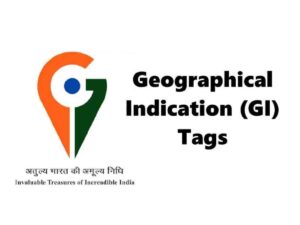Geographical Indication (GI) Tag: Preserving the Unique Identity and Heritage of Products
Relevant for Prelims and GS paper- 2

A Geographical Indication (GI) Tag is a sign used on products that have a specific geographical origin and possess qualities or a reputation that are due to that origin. The purpose of the GI tag is to provide an identity to the product, to promote and protect it from unauthorized use, and to ensure that the quality and uniqueness of the product is maintained.
In India, the Geographical Indications of Goods (Registration and Protection) Act, 1999, governs the registration and protection of GI tags. The GI Registry in Chennai is responsible for registering and granting GI tags to products that meet the criteria for registration.
The registration process involves a thorough examination of the product’s origin, production process, and unique characteristics. Once the product is granted a GI tag, it is entitled to legal protection under the Act. No one can use the GI tag on a product that does not meet the necessary criteria, and doing so is a punishable offense.
Some examples of products that have been granted GI tags in India include Darjeeling tea, Alphonso mangoes, Kanchipuram silk sarees, Pashmina shawls, and many more.
The benefits of obtaining a GI tag include increased marketability, higher prices for products, and protection against counterfeiting and misuse. Additionally, GI tags help to promote local and traditional products, which helps to preserve cultural heritage and traditional knowledge.
Overall, the GI tag is an important tool for promoting and protecting the unique identity and quality of products that have a specific geographical origin.
For more such notes, Articles, News & Views Join our Telegram Channel.
Click the link below to see the details about the UPSC –Civils courses offered by Triumph IAS. https://triumphias.com/pages-all-courses.php

